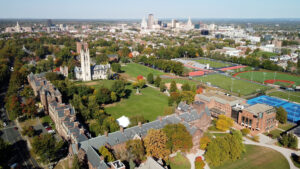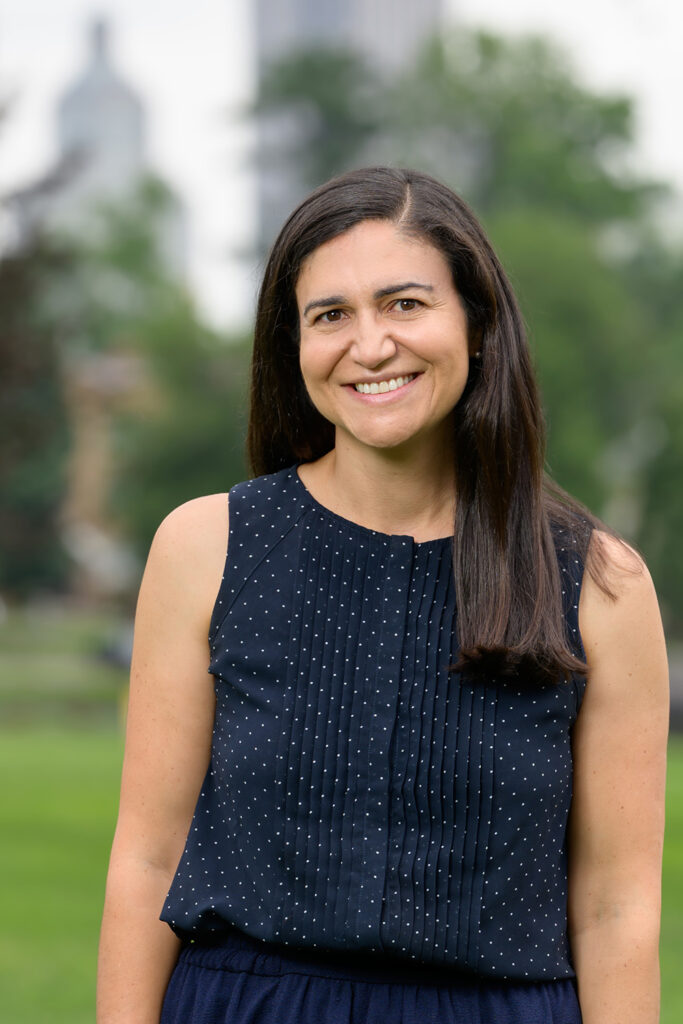
‘Always Something New’: Explore Book Recommendations from Trinity College Faculty
Vy Duong ’26 asked some Trinity professors to recommend interesting books to students and other members of the College community.

Laura Humm Delgado, assistant professor of urban studies, has been awarded a yearlong fellowship to pursue research about the impact of urban gentrification on a population of older adults.

An American Postdoctoral Research Leave Fellowship from the American Association of University Women (AAUW) will support Delgado’s historical research on United South End Settlements, a nonprofit community-based organization in Boston, as part of her project, “Unsettled: Gentrification’s influence on one social service organization’s ability to serve older adults of color over fifty years.”
“I’m looking at older adults aging in place, especially in gentrifying neighborhoods, who tend to lose community resources,” Delgado said. “Public places they used to go may not be available; shops they used to go to may disappear. We know these spaces dwindle for older adults of color in gentrifying neighborhoods. The question is, why are these spaces disappearing?”
This research explores the challenges faced by one particular social service organization and how those challenges shaped the services and spaces dedicated to older adults in the community, many of whom were of color, between the 1970s and 2020s.
Delgado—who grew up in the Boston area and worked as a city planner for several years before earning a Ph.D.—said that she plans to use United South End Settlements as a lens for understanding cities and some of the challenges they face.
“This research focuses on how gentrification in the South End of Boston impacted Black and Latino older adults and how they’re served by this organization,” she said. “This organization for decades was a champion of protecting housing for older adults of color, providing services, free lunches, arts classes, and more, but at the same time they faced a lot of challenges from gentrification, from welfare reform, and a shift in the nonprofit funding atmosphere. So eventually they ended up ending their senior programs. My research looks at the complicated forces that organizations like this face.”
During the period of the fellowship—which runs from July 1, 2025, to June 30, 2026— Delgado plans to make use of archives at Boston’s Northeastern University and to conduct interviews. She plans to publish an article about older adults and gentrification through this organizational lens. “Longer term, I’ll also put together book proposal that uses United South End Settlements as a lens to understand the Progressive Era, the settlement house movement, the Great Depression, urban renewal, and gentrification in general,” she said. “It’s an interesting organization through which to understand the city more broadly.”
Among the courses Delgado teaches at Trinity is “The American City,” a first-year seminar that explores many of the same topics as her research. “I always like to combine practice and theory in my teaching,” she said. “My background in city planning blends together physical planning and social policy.”
Delgado said Trinity students have a natural interest in urban studies. “They all live in a city right now; they’re residents of the capital city of Hartford, and they should have a better understanding of what the city is,” she said. “But also, we’re becoming an increasingly urbanized world. Most of the world’s population lives in cities. Cities can be wonderful places with lots of opportunities, but they also can be rough places that are hard to get ahead in. They can help us understand environmental sustainability, labor markets, housing markets, segregation, and racism. A lot of things that affect people’s everyday lives can be understood in an urban context very well.”
The American Postdoctoral Research Leave Fellowship Program increases the number of women in tenure-track faculty positions and promotes gender equity for women in higher education by providing funding to women in academia to pursue independent research over the course of a year, according to the AAUW. Awarded since 1888, AAUW American Fellowships are the oldest noninstitutional source of graduate and postdoctoral funding for women in the United States.
Learn more about urban studies at Trinity here.